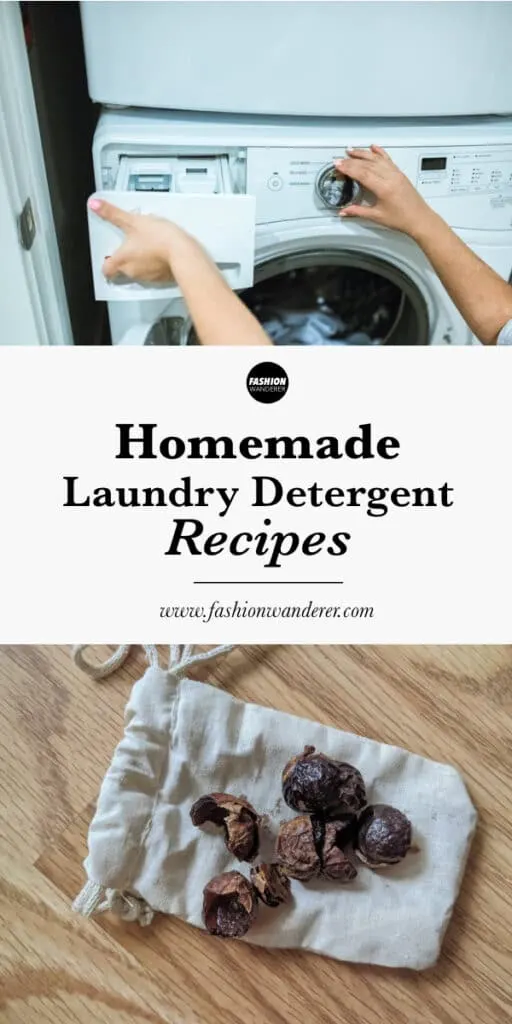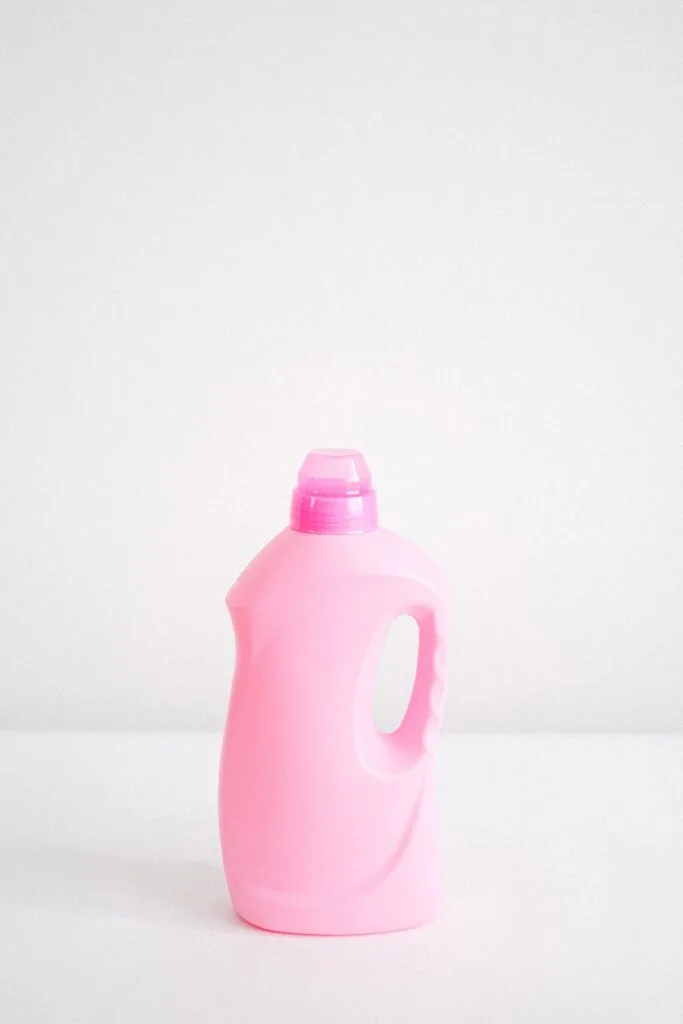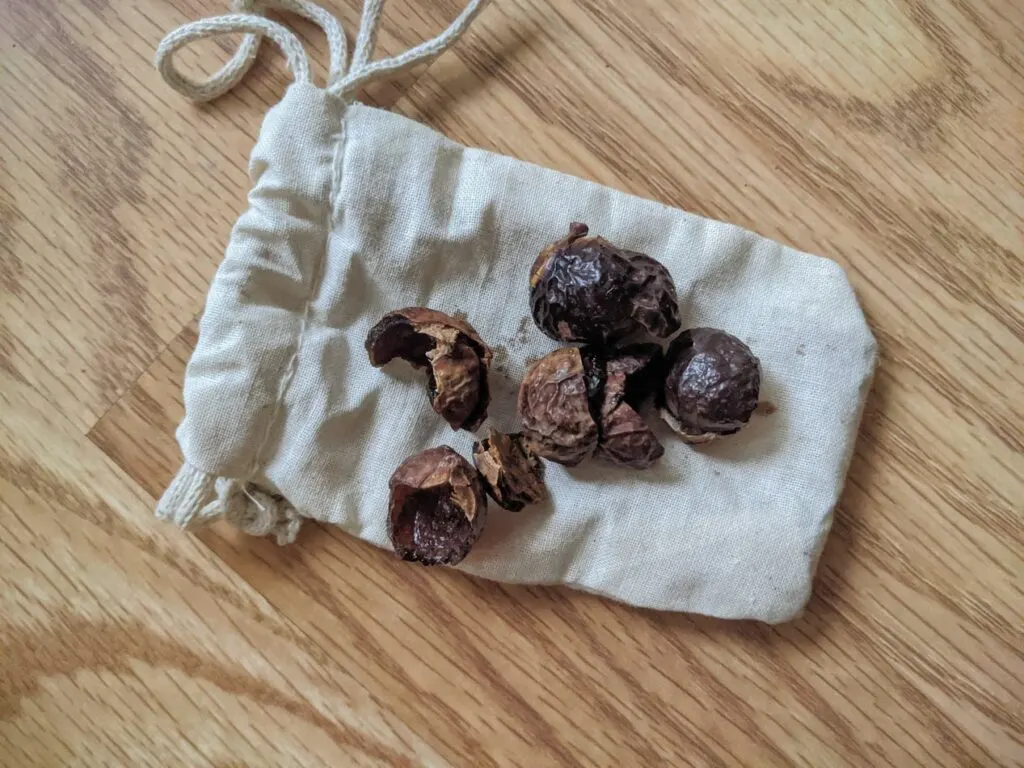Now we have built a closet full of trendy and perfectly fitted essential wardrobe pieces, its time to properly clean our favorite garments. Encourage long lasting durability by keeping your clothing smelling fresh, feeling soft, and also maintaining bright colors. In this post, we will discuss our favorite homemade laundry detergent in order to determine which is the best recipes and why.
Soap has been a staple household ingredient for thousands of years, dating back to the ancient Egyptians nearly 5,000 years ago. Soaps were originally made with animal fats and also soda ash. Soap has been around since around 2800 B.C., while synthetic detergents have only been around since 1916.
Therefore, laundry detergents are a relatively recent invention, and are not really considered to be soap. While soap is made from vegetable or animal fats and oils, synthetic detergents are actually a petroleum-based product.
Synthetic detergents were originally developed due to WWI shortage of fats for soap making in Germany. As a result, commercial detergent manufacturing is a product of WWII era due to a shortage of fat and natural oil needed for a military grade cleaner.
Detergents are made with surfactants, which are also created using a complex chemical reaction. Furthermore, detergents are a man-made mixture, while soap is natural. However, until WWI all laundry was washed using soap.

Do homemade laundry detergents work?
Soap is considered better than detergents in regards to health and the environment. Detergents are made with chemical ingredients that are considered harmful to fish and wildlife. Soap can react with minerals found in water and leaves behind a residue if not rinsed correctly.
Soap and detergent are used to clean because they both contain surfactants, compounds used to reduce surface tension between the clothing and water. Both soap and detergent effectively clean clothing when facilitated with friction and water.
Laundry detergent is a synonymous term that society has become familiar with using. This is similar to the reason we refer to all facial tissue as “Kleenex.” Even if you are not using that brand, the term represents a product.
As a result, some laundry detergents contain soap, while others are made with detergent. However, if a DIY laundry detergent doesn’t include either detergent or soap, then it will not contain the same cleaning power.
Does homemade laundry soap really clean?
Homemade laundry soap must contain surfactants to really clean. The surfactants reduce the surface tension of the water, which results in cleaning power that freshens soiled clothing.
Both homemade laundry detergent and synthetic detergent contain alkali compounds that help to soften hard water. These homemade laundry detergent recipes contain either washing soda or baking soda.
Soft water cleans clothing more effectively than hard water. As a result, you are able to use less laundry detergent.
Furthermore, synthetic detergents contain brightening agents, which I have substituted for sodium percarbonate.
The modern washer machine performs all the cleaning by applying friction, pressure and water. Detergents help to break down the barriers between the water molecules.
Dirt is loosened from the fabric by the water, friction and surfactants. Grease and dirt particles are then suspended in the water using the detergent, and then rinsed away clean.
We chose to live an environmentally safe and sustainable lifestyle as much as possible. When it came to doing laundry, we realized how much we could reduce the environmental impact we were causing.
As a result, we embarked on this journey to learn as much as possible about how to clean clothing in the least harmful manner possible. In addition, it turned out that we were about to save lots on money.
Is DIY laundry detergent safe?
Because you control the ingredients, the homemade recipes are considerably safer to use. Since soap is soap, then steer clear of the artificial colors and fragrances.
Borax and washing sodas are used to soften water hardness, which improves the effectiveness of cleaning agents. Furthermore, they brighten whites, neutralize bad odors, disinfect clothing, and also help remove a wide range of stains like grease, blood and coffee.
Is it cheaper to make your own laundry detergent?
The average consumer spends about $15-$25 once or twice a month on laundry detergent. Based on consumer research poll, this means people spend on average between $180-$600 per year (or every 300-400 loads of laundry) on detergent.
It is definitely cheaper to make homemade laundry detergent. Source the ingredients at the best price and you will save quite a bit of money in the long run. Furthermore, softening water has a large impact on reducing the amount of detergent necessary for cleaning clothing.
Of course there are other factors to consider in evaluating overall cost. Consider whether the DIY detergent cleans as well, removes stains effectively, and also maintains fabric and color quality. The better your clothing looks and the longer it lasts, the more effective the cost savings.

How To Whiten Clothes Naturally
There are a handful of common household products to whiten clothes naturally. Baking soda, borax, lemon juice, hydrogen peroxide and vinegar keep whites whiter.
Add 1/2 cup of the ingredients to a laundry load for an added whitening boost. For extra strength, 1/2 cup of baking soda and 1/2 cup of vinegar work extremely well when added to a load of whites..
To make white clothes even whiter:
- Wash in warm water
- Dissolve detergent in the water before adding the laundry
- Allow the laundry to agitate because friction in the laundry machine combined with surfactants cleans the clothing. Don’t over fill the washer.
- Give the detergent enough time to work efficiently. Pretreat stubborn stains to allow for extra time to deep clean. Consider adding extra soaking time for tough grease or grime. As a result, this prevents the need to increase the amount of detergent.
- To naturally whiten white clothes, soak clothing is a solution of lemon juice, hydrogen peroxide or non-chlorine oxygen based bleach with water.
Will baking soda and vinegar ruin clothes?
Add baking soda to the wash cycle, and vinegar to the rinse cycle, and not in reverse. The baking soda raises the alkalinity and makes the water feel slicker. This naturally boosts the cleaning power of the laundry detergent. The vinegar acts as a natural fabric softener that preserves the bright colors in clothing.
Will baking soda remove color from clothes?
Responsibly spot test a nonvisible area of a garment when using any new products. However, baking soda is considered safe to use when cleaning laundry and will not ruin clothes.
Pretreat with baking soda to remove tough stains. Furthermore, adding 1/2 cup of baking soda in the wash cycle, along with your regular detergent, will brighten colors, make white even whiter, and also eliminate any bad odors.
In addition, baking soda is an alkaline ingredient that makes water feel slicker. As a result, you can use less detergent for the same amount of cleaning power.
Will vinegar alone clean clothes?
White vinegar does not clean clothes and is not recommended to used by itself. Vinegar is best used as a natural fabric softener to replace commercial brands.
Add 1/2 cup of vinegar to the final rinse cycle of the washing machine. Clothes will come out feeling soft and smooth, without any residue left behind.
Can you use vinegar and laundry detergent together? Vinegar is only used as a natural fabric softener. Add 1/2 cup of white vinegar to the last rinse cycle of a load of laundry.
Does vinegar disinfect laundry? Although vinegar is effective at killing some bacteria, it does not completely disinfect laundry. In addition to keeping colors bright and reducing odor-causing bacteria, vinegar works best as a natural fabric softener. As a result, vinegar does not replace the need for laundry detergent, just improves the clothing cleaning process.
Does homemade laundry detergent cause buildup in your washing machine?
Homemade laundry detergent and soap both work great on dirty clothes when used correctly. Using too much soap for the load or hard water conditions tend to leave behind a residue or “soap scum.”
Why homemade laundry soap is bad? DIY laundry detergent can ruin your clothes if hard water conditions are present. If minerals like calcium and magnesium are in excess, then the soap will react with the dissolved minerals. As a result, unwanted residue will be left behind on your clothes and the inside of the washing machine.
Eliminate the soap buildup by adding white vinegar to the final rinse of the laundry cycle. Vinegar helps to break down soap residue, and therefore is a natural alternative to preventing soap residue. Fill the fabric softener tray with white vinegar or consider using an automatic fabric softener dispenser filled of vinegar in each load.
Detergent residue and hard water laundry troubles affect the cleaning power of synthetic detergents as well. As a result, laundry additives like optical brighteners and washing soda are found in the laundry aisle.
Making your own homemade laundry detergent is easy, budget-friendly way to avoid chemicals that ruin our clothes and damage the skin. I’m sure that you have come across multiple homemade laundry detergent recipes, but are they all worth trying? Lets evaluate the pros and cons of making your own laundry detergents.
Homemade Laundry Detergent Pros:
- The ingredients are natural and family friendly. By choosing eco-friendly nontoxic ingredients, you can reduce the concern for asthma, skin rash or allergy irritation. Homemade laundry detergents cause less harm to the environment and definitely less overall pollution. Making the recipes at home yourself, you can control the fragrance used and choose a safer substitutes. Essential oils are better natural scents for humans and are pet friendly too.
- Easy to make recipes. Yes, they take a little time, but generally you are preparing large enough batches to last a long time. Most of the time the ingredients can already be found around the house and are not hard to source from the local market.
- A frugal living way to save money. The ingredients are always affordable and can be make in any size batch. You can easily save money making large batches of homemade detergents.
- Lasts a long time. Because most often you only use 1 tablespoon at a time, the batches last a long time. How long does you standard laundry detergent last?
- You control the ingredients. By making it yourself, you know exactly what goes into the detergent mixture and how natural it really is. The Environmental Working Group does a fantastic job of providing ratings that empower people to live healthier lives in a healthier environment..
Homemade Laundry Detergent Cons:
- It is a little less convenient. You may need to source ingredients from different locations. Then, you need to spend the time to make the mixture. In addition, you’ll need to find the proper container to store the finished product. Not all of the processes are a big deal, but making your homemade laundry detergent does take some extra time.
- Your clothes may not be as soft as when you use a store bought laundry detergent. Conventional detergents contain lots of harmful chemical additives that make clothes feel softer to the touch. For this reason, I adapted a homemade fabric softener to use with your DIY laundry detergent. When combined together, you have fresh smelling clothes that feel extremely soft.
- Some stains just don’t come off as easy when using homemade detergents. If the stain is really set, I use a homemade pretreatment stain remover. The recipe is included at the bottom of this post so that you can incorporate it into your DIY laundry detergent routine. I also recommend using vinegar in the rinse cycle to provide additional cleaning and to remove any excessive odors.
- It takes time and can also be a messy job depending on the recipe you choose of course. Some processes require you to grate a bar of soap, which can easily take more than 10 minutes. In addition to processing and mixing ingredients, you will need to clean up the mess you created afterwards. But if you accept the challenge, preparing your homemade laundry detergent recipes will be a piece of cake.
Is Borax really good for you?
Borax has been advertised as a “safe” and “natural” household product for decades. Yes, its true that borax is natural occurring on earth, but it certainly contains a level of toxicity.
Is Borax safe to use in homemade laundry detergent? Borax is used to make boric acid, but there is a distinct chemical difference between the two. Borax is a naturally occurring mineral, which by no means makes it nontoxic or safe.
Arsenic and mercury are two examples of the many naturally occurring elements that aren’t safe for human consumption or use. In the end, it’s really up to you to determine whether or not borax is safe for your family and pets.

Easy To Make Homemade Laundry Detergent Recipes
But after weighing out the pros and cons, making homemade laundry detergents are seriously the best way to preserve your own natural health. The extra time maintains the long lasting condition of clothes and is an excellent frugal way to be stylish!
Make your clothes smell good every time! Let’s learn how to make these essential nontoxic homemade laundry detergent recipes to make your laundry easier save time and money:
4 Ingredients Powder Laundry Detergent
Recipe from Frugal Family Home
Do you need more than 4 ingredients for your simple, homemade, laundry detergents? This diy nontoxic homemade laundry detergent recipes cost only pennies per load and cleans really well. Its truly one of my favorite budget friendly savings hacks.
This recipe contains Borax laundry booster, which is a questionable ingredient for some. Fels Naptha Laundry Bar is the natural soap used in this recipe, not detergent. I choose to not use the fragrance when making this recipe myself. This recipe is easy to make.
Borax Free A-Rated Laundry Detergent
Super easy nontoxic homemade laundry detergent recipes that rates A on the EWG Healthy Cleaning scale. It makes 320 loads of non-toxic (especially since its borax-free) for around $20, thats a great deal!
I enjoy the combination of Fragrance Free Coco Castile Soap Bars with the power of Baking Soda & Super Washing Soda.
OxiClean and Epsom Salt are the additional stain remover boosters.
Chemical Free Liquid Laundry Detergent
If you love essential oil and are also a Dr. Bronner soap fan like me, this recipe is especially for you! You can pick your favorite essential oil fragrance and your favorite outfits will smell great and it’s also safe for HE washers.
Reuseable Laundry Dryer Sheets
Recipe from TheWifeStyle
With only white vinegar, cotton clothes and a few drops of your favorite essential oils, you can also make dryer sheets super quick and easy!
All-in-One Laundry Bombs
Who doesn’t love fragrance aroma bombs? From bathtub bombs to laundry bombs, it smells great and makes clothes feel much cleaner than the commercial brand laundry detergent.
DIY Laundry Softener
Love wearing super soft and cozy knit dresses after being freshly washed? This recipe is go-to. Use your favorite conditioner that smells great; it’s a cheap way to add smoothness to each load.
DIY Natural Febreze
With only baking soda and drops of any essential oil of your choice, you can keep your clothes smelling fresh on a budget with this nontoxic homemade laundry detergent recipes!
DIY Laundry Pods
Use only natural ingredients to make these 120 laundry pods, depending on the size of the mold, for around $25! This is one of our favorite nontoxic homemade laundry detergent recipes.
Bonus: Ever Hear of Soap Nuts?
Soap nuts are not actually a nut, but rather a berry. They contain active surfactants and may possibly be my favorite laundry detergent recipe. Make a simple liquid solution using the soap berries boiled in water. In addition, add some essential oils for fragrance and voila!
It is really important to remember the true value and savings comes from preserving your favorite wardrobe pieces. This also prevents you from having to rebuy new items very often.
Maintaining your delicate items starts at home with every single load of wash. Remember to care for your skin by using mild and gentle ingredients.
Also, maintain the bright colors of your clothing by using proper washing techniques whether you use a washing machine, or hand wash clothes regularly. Furthermore, I hope you found this article useful, I sure enjoyed putting it together!
How do you wash your clothes?
Share your favorite nontoxic homemade laundry detergent recipes with us!

Laura Negron
Saturday 7th of July 2018
I want to try this. I spend so much on laundry detergent. Great post.
admin
Sunday 22nd of July 2018
Thanks Laura! These nontoxic homemade laundry detergents really work well! After you try out these recipes let us know your results to help inspire others to give them a try!